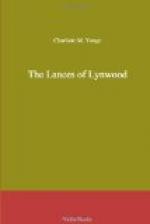The French, dismayed by the reception of their guide, held back; but presently a pursuivant came forward from their ranks, and, after his trumpet had been sounded, summoned, in the name of the good Knight, Messire Oliver de Clisson, the garrison of Chateau Norbelle to surrender it into his hands, as thereto commissioned by his grace, Charles, King of France.
The garrison replied by another trumpet, and Gaston, standing forth upon the battlements, over the gateway, demanded to speak with Sir Oliver de Clisson, and to have safe-conduct to and from the open space at the foot of the slope. This being granted, the drawbridge was lowered, and the portcullis raised. Ferragus entered, and went straight to his own stall; and Gaston d’Aubricour came forth in complete armour, and was conducted by the pursuivant to the leader of the troop. Sir Oliver de Clisson, as he sat on horseback with the visor of his helmet raised, had little or nothing of the appearance of the courteous Knight of the period. His features were not, perhaps, originally as harsh and ill-formed as those of his compeer, Bertrand du Guesclin, but there was a want of the frank open expression and courteous demeanour which so well suited the high chivalrous temper of the great Constable of France. They were dark and stern, and the loss of an eye, which had been put out by an arrow, rendered him still more hard-favoured. He was, in fact, a man soured by early injuries—his father had been treacherously put to death by King John of France, when Duke of Normandy, and his brother had been murdered by an Englishman—his native Brittany was torn by dissensions and divisions—and his youth had been passed in bloodshed and violence. He had now attained the deserved fame of being the second Knight in France, honourable and loyal as regarded his King, but harsh, rigid, cruel, of an unlovable temper, which made him in after years a mark for plots and conspiracies; and the vindictive temper of the Celtic race leading him to avenge the death of his brother upon every Englishman who fell into his hands.
“So, Sir Squire!” exclaimed he, in his harsh voice, “what excuse do you come to make for slaying my messenger ere he had time to deliver his charge?”
“I own him as no messenger,” returned Gaston. “He was a renegade traitor from our own Castle, seeking his accomplice in villainy!”
“Well, speak on,” said Oliver, to whom the death of a man-at-arms was a matter of slight importance. “Art thou come to deliver up the Castle to its rightful lord?”
“No, Messire Oliver,” replied Gaston. “I come to bring the reply of the Castellane, Sir Eustace Lynwood, that he will hold out the Castle to the last extremity against all and each of your attacks.”
“Sir Eustace Lynwood? What means this, Master Squire? Yonder knave declared he was dead!”




